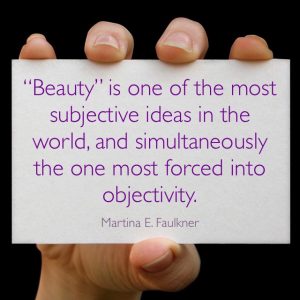“Beauty” is one of the most subjective ideas in the world, simultaneously the one most forced into objectivity.

As women (because I can only speak from my female perspective), we live in a society where we are told, both directly and indirectly, what’s beautiful. We are encouraged to buy and use products to be more like the “traditional (aka: objectified) standard of beauty” in order to actually be deemed “acceptable.”
Over the years, out of curiosity I have asked my male friends (and exes) what they consider sexy, or beautiful, in a woman. Their answers were as varied as the people themselves, but here are just a few I found interesting:
- A silk blouse with no bra on
- A black lace see-through nightgown
- Long hair
- Confidence
I have done the same exercise with my female friends and here are some of their answers:
- Smokey eye makeup and red lipstick
- Authentic laughter
- High heels
- Confidence
While there was some overlap among answers (I love that ‘confidence’ came up both times!), there was also a lot of difference that didn’t necessarily stick to a “traditional” gender divide.
And that’s what’s most important here: Even among genders, beauty is defined and experienced differently. There is no one standard of beauty when you actually break it down and ask people. There are millions. And they’re all correct.
Because Beauty, at its core, is individual, globally undefinable, and highly subjective.
Let’s look at this another way. Let’s apply the same idea to flowers:
A lot of people don’t particularly like roses and prefer another flower, but that doesn’t mean they’re not beautiful. For those who love them, roses can be one of the most beautiful flowers in the world. For me, I happen to think a carnations and dandelions are stunning. A dandelion’s delicately tiny petals belie it’s extraordinary resilience. Yet there are entire products built around killing them off because they’re a “weed.” See? Subjective. (Besides, dandelion greens in a salad kick flavor up a notch! Weed, indeed. LOL)
It’s the exact same with human beauty. What’s beautiful to you might not be “beautiful” to the person standing next to you, which is why it’s so incredibly subjective. I’d venture to say that it’s the most subjective idea we engage with on a daily basis, that we are taught to experience as 100% objective.
Beauty, therefore, is truly in the eye of the beholder. And always – always – will be. Thankfully.
